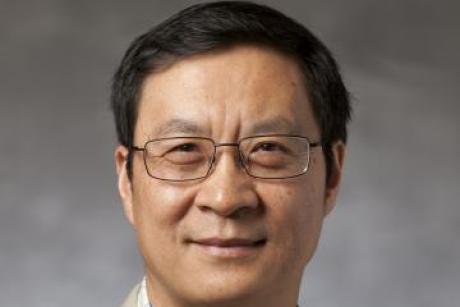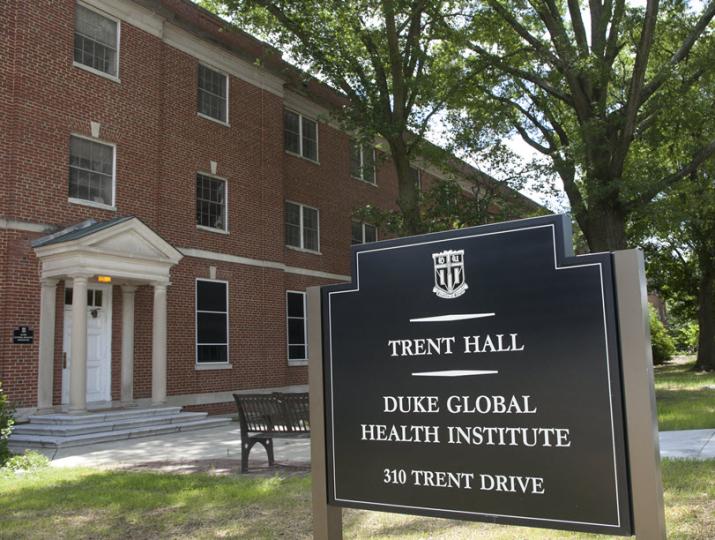
Trent Hall, home of DGHI.
Published February 7, 2017
In the past year, the Duke Global Health Institute (DGHI) has welcomed six new affiliate faculty members representing a wide range of academic disciplines, including engineering, obstetrics and gynecology, romance studies, pulmonary care, pediatrics and environmental science.
Affiliates are faculty members from across the university with a demonstrated interest in global health who collaborate with DGHI on research, education, service or policy activities.
Meet the New Affiliates
 MICHAEL BERGIN
MICHAEL BERGIN
Professor in the Department of Civil and Environmental Engineering
Pratt School of Engineering
Michael Bergin’s research focuses on the influence of air pollution on both climate and human health, with a specific interest in how particulate matter (PM) impacts climate by modifying the radiation balance of the atmosphere.
Recently, Bergin has been studying the influence of PM on human health with emphasis on determining the relative contributions of sources (such as biomass burning and vehicle emissions) to acute health impacts. He’s also involved in developing and deploying the next generation of air quality sensors.
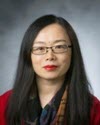 LIPING FENG
LIPING FENG
Assistant Professor of Obstetrics and Gynecology
Duke Obstetrics and Gynecology
Liping Feng has devoted her career to improving pregnancy outcomes through innovative research. Her work has focused on understanding the mechanisms of preterm birth, an important cause of perinatal and neonatal mortality and morbidity.
Feng serves as director and instructor for Duke Molecular Bio Techniques Workshop. This two-credit workshop is designed to train clinical fellows in basic laboratory techniques. In addition, Dr. Feng has established an international collaboration in global women’s health.
 BETHZAIDA FERNANDEZ
BETHZAIDA FERNANDEZ
Lecturer
Romance Studies
Bethzaida Fernandez teaches all levels of Spanish with an emphasis on intermediate and advanced courses with core content on health and Latino/a immigration issues. Her interests include second-language teaching and learning methodologies, technology in the second language classroom, community-based and service-learning pedagogies, intercultural competence development, Latino/a immigration and global health. She directs the Duke in Costa Rica summer abroad program and coordinates the Intermediate Spanish Language Program.
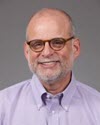 PETER KUSSIN
PETER KUSSIN
Professor of Medicine
Department of Medicine – Pulmonary, Allergy and Critical Care
Peter Kussin’s main areas of focus are clinical care of patients with advanced lung disease and teaching. He spends four months per year in Eldoret, Kenya, working at Moi Teaching and Referral Hospital as part of the Duke Hubert-Yeargan Center for Global Health and AMPATH—a consortium of North American medical schools collaborating with Moi University School of Medicine and Moi Teaching and Referral Hospital. He works primarily in the intensive care unit and medicine wards.
Kussin is involved in a broad range of research efforts in critical care and pulmonary medicine in resource-limited countries.
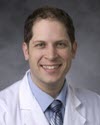 PAUL LANTOS
PAUL LANTOS
Medical Instructor
Departments of Medicine and Pediatrics
Paul Lantos is interested in the spatial epidemiology of infectious diseases. His research uses geographic information systems (GIS) and geostatistical software to understand the spatial and spatiotemporal distribution of diseases and their relationship with environmental and demographic factors. He currently has active studies of influenza, cytomegalovirus, Lyme disease, dengue, tick-borne rickettsial diseases and socioeconomic health disparities. He’s also interested in GIS education and has conducted workshops on public health GIS in Mongolia and China.
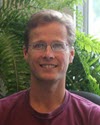 JOEL MEYER
JOEL MEYER
Associate Professor of Environmental Toxicology
Director of Graduate Studies, ENV PhD program
Nicholas School of the Environment
Joel Meyer studies the effects of genotoxic agents on human and wildlife health. He’s interested in understanding the mechanisms by which environmental agents cause DNA damage, the molecular processes that organisms employ to protect prevent and repair DNA damage and genetic differences that may lead to increased or decreased sensitivity to DNA damage.
Meyer studies DNA repair and other responses to DNA damage via PCR-based analysis, genomic and systems biology approaches, and organism-level responses.
